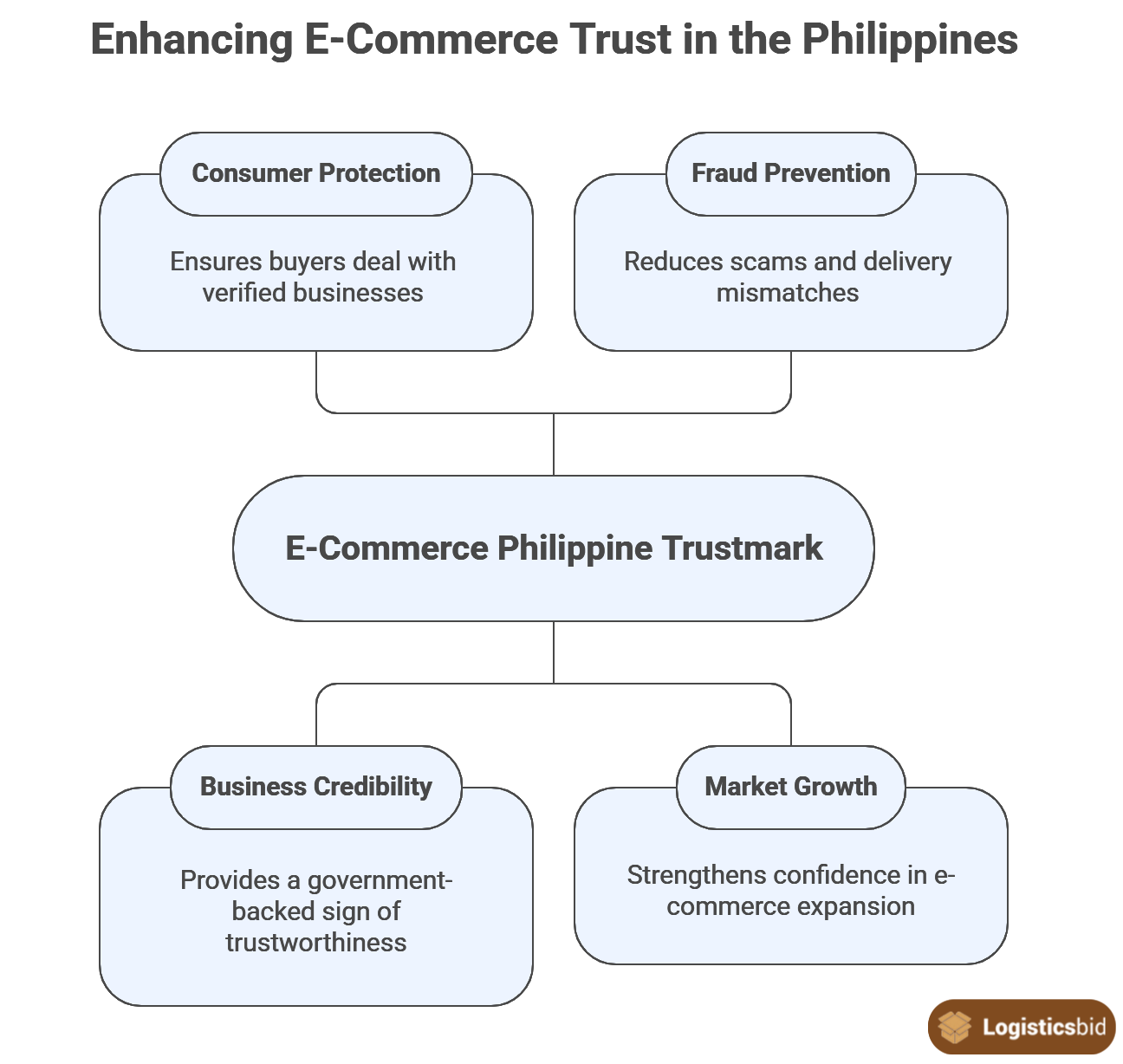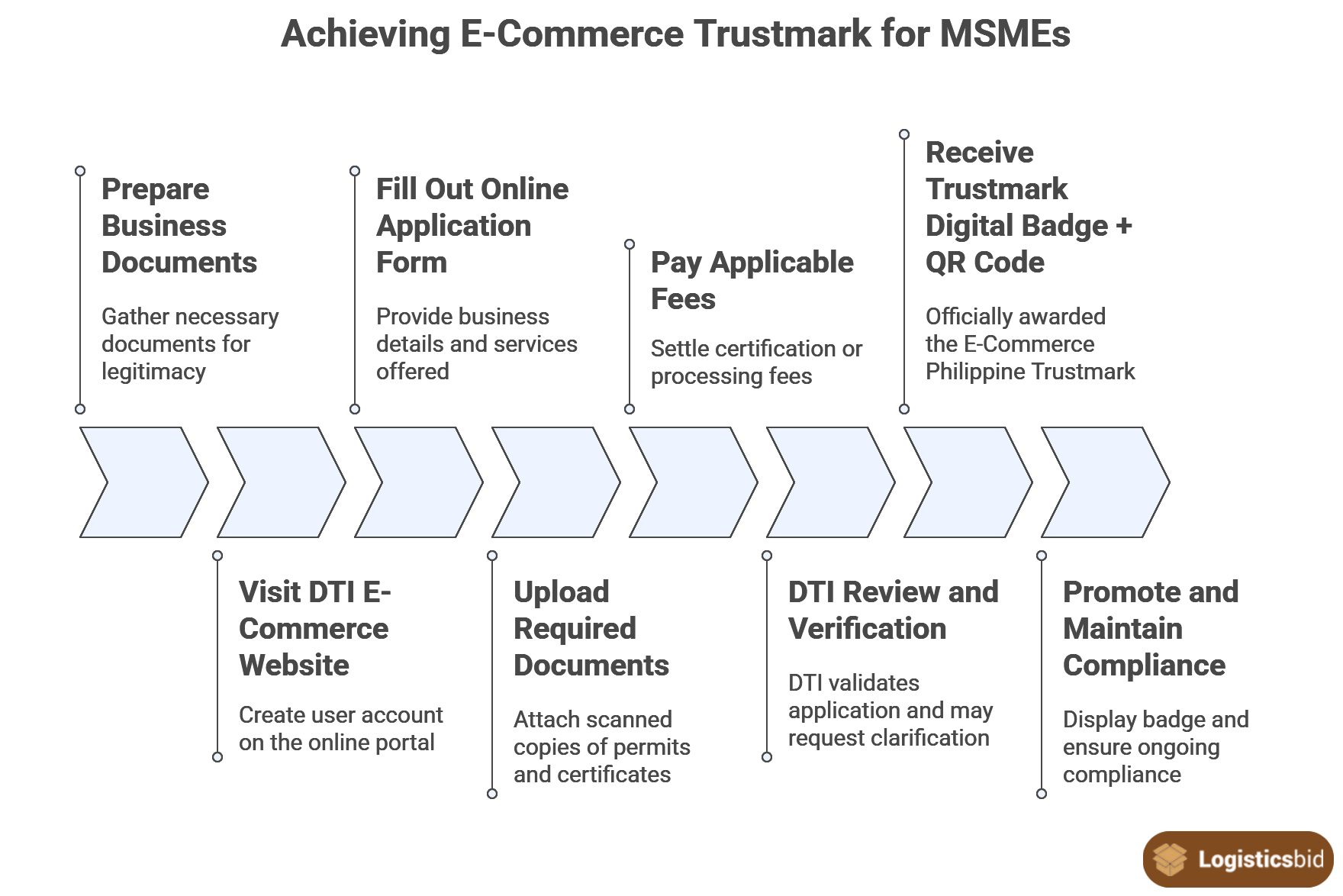
The E-Commerce Philippine Trustmark is a government-issued digital badge introduced by the Department of Trade and Industry (DTI) to help verify legitimate online sellers, platforms, and marketplaces. As part of the implementation of the Internet Transactions Act (Republic Act No. 1167) , this initiative addresses the growing problem of fraudulent online selling, fake shops, and consumer mistrust in online transactions. With over 13,000 consumer complaints filed in just the first eight months of 2025, the trustmark aims to protect Filipino shoppers while encouraging fair and transparent practices among businesses.
What is the E-Commerce Philippine Trustmark?
The Trustmark is a digital verification seal granted by the DTI to registered online businesses that comply with industry regulations and consumer protection standards. It is displayed as a badge on participating companies’ websites, platforms, or applications.

Key Purposes of the Trustmark
- Consumer Protection: Ensures that buyers deal only with verified and accountable businesses.
- Business Credibility: Gives legitimate merchants a government-backed sign of trustworthiness.
- Fraud Prevention: Helps reduce scams, fake sellers, and delivery mismatches.
- Market Growth: Strengthens confidence in Philippine e-commerce, which continues to expand rapidly.
According to Eryl Royce R. Nagtalon, Officer-in-Charge of the DTI E-Commerce Bureau, the trustmark represents “a mark of compliance with legal and regulatory standards, giving greater assurance that consumers are engaging with trustworthy businesses.”
How is the Trustmark Being Implemented?
Mandatory Registration Requirement
Under Department Administrative Order No. 25-12, all online merchants, e-retailers, e-marketplaces, and digital platforms are required to register with the DTI to obtain a Trustmark by September 30, 2025.
Early Industry Compliance
As of September 10, 2025, the DTI reported that 90 trustmarks had already been issued to major players, including:
- Shopee Philippines
- TikTok Shop (ByteDance Philippines)
- Lalamove Philippines (logistics and delivery)
- LG Electronics Philippines
- DHL Express (Mailtag Ortigas Corp.)
- Carrier (Concepcion Carrier Air Conditioning Co.)
- Midea, Asahi, Tosot, and Tefal (through Pan-Eurasia Sales Marketing Corp.)
- GoGo Xpress & ShippingCart (QuadX Inc.)
- Billease (First Digital Finance Corp.)
These early adopters demonstrate industry-wide support and pave the way for small and medium-sized enterprises (SMEs) to follow suit.
Why is the Trustmark Important for Consumers?
Growing E-Commerce Risks in the Philippines
From January to August 2025, the DTI handled 13,000 complaints related to fraudulent online sales.
Complaints commonly include undelivered items, counterfeit products, and unresponsive sellers.
Given that over 76 million Filipinos are now internet users (Statista, 2025), digital trust has become essential.
Trustmark-Registered vs. Non-Registered Businesses
| Feature | Trustmark-Registered Business | Non-Registered Business |
|---|---|---|
| Verification Status | Verified by DTI with a digital badge and QR code linked to the official database | No official verification; authenticity uncertain |
| Consumer Confidence | High trust due to government certification | Low trust; consumers may hesitate to transact |
| Legal Compliance | Meets standards under the Internet Transactions Act (RA 1167) and DTI regulations | May be operating informally or non-compliant |
| Fraud Risk | Significantly reduced, as sellers undergo checks and verification | Higher risk of fake products, delivery scams, and ghost sellers |
| Business Credibility | Enhanced brand image and competitive advantage | Vulnerable to negative reputation and loss of customers |
| Dispute Resolution | Consumers can seek assistance through DTI mechanisms | Consumers have limited recourse; resolution often depends on seller goodwill |
| Access to Partnerships | Eligible to work with major e-commerce platforms, logistics firms, and marketplaces leveraging Trustmark verification | May be excluded from platforms or partnerships that require compliance |
| Consumer Protection Tools | QR-based verification, transparency measures, and compliance monitoring | None; buyers assume risk in every online transaction |
| Growth Opportunity (MSMEs) | Greater customer reach due to higher trust; easier to compete in digital economy | Reduced growth potential due to lack of trust guarantees |
| Example Companies Registered | Shopee, TikTok Shop, Lalamove, LG Electronics, DHL Express | Informal social media sellers, unregistered online shops, pop-up stores |
Consumer Benefits
- Easier Verification: Consumers can scan the QR code on the trustmark to confirm business legitimacy.
- Online Transaction Safety: Increased protection against scams when purchasing from trustmark-certified sellers.
- Accountability: Registered platforms and sellers are held to regulatory standards.
How Can MSMEs Benefit from the Trustmark?
For micro, small, and medium enterprises (MSMEs) , the trustmark is both a compliance requirement and a growth opportunity.
Advantages for MSMEs
- Increased Customer Trust → More buyers are likely to transact with verified sellers.
- Market Visibility → Being on the official DTI database gives legitimacy and discoverability.
- Risk Reduction → SME partners get access to support systems and fraud monitoring.
- Partnership Opportunities → Verified businesses gain credibility when collaborating with larger marketplaces.
Many SMEs using Lalamove, GoGo Xpress, or ShippingCart are already being assisted with their applications, ensuring they remain competitive in the regulated environment.
How to Register for the E-Commerce Philippine Trustmark (For MSMEs)
Step 1: Prepare Your Business Documents
Before applying, gather the required documents to prove your legitimacy as an online seller or service provider.
- DTI Business Name Registration (or SEC/CDA Certificate for corporations/cooperatives)
- Mayor’s Permit / Business Permit
- Valid Tax Identification Number (TIN) & BIR Certificate of Registration (Form 2303)
- Business website, app, or social media store links where your products/services are sold
Tip: Make sure your business permits and contact information are updated to avoid delays.
Step 2: Visit the DTI E-Commerce Website
- Go to the DTI E-Commerce Bureau online portal
- Look for the section titled “Philippine Trustmark Application”
- Create a user account with your business information
This will be your official profile for Trustmark compliance.
Step 3: Fill Out the Online Application Form
Provide the following information:
- Business name, type, and registration details
- Products or services you offer
- Business address and contact information
- URL/links of e-commerce site, online marketplace, or app
Double-check accuracy, as this information will reflect in the DTI Trustmark Database consumers can scan.
Step 4: Upload Required Documents
- Attach scanned copies of your permits and certificates via the portal.
- Ensure all documents are clear, valid, and consistent with the business name and owner information.
Submitting incomplete or outdated permits is one of the top causes of delays.
Step 5: Pay the Applicable Fees (if any)
- Some classifications of businesses or platforms may be required to pay certification or processing fees.
- Confirm the amount via the official DTI guidelines.
- Pay through GCash, online banking, or authorized payment centers.
Step 6: DTI Review and Verification
- The DTI E-Commerce Bureau will review and validate your application.
- They may contact you for clarification or additional requirements.
- Once approved, your business will be registered in the official online database.
Note: Processing time may vary depending on the volume of applications.
Step 7: Receive Your Trustmark Digital Badge + QR Code 🎉
Your business will be officially awarded the E-Commerce Philippine Trustmark.
You’ll receive:
- A digital Trustmark badge to display on your website/app/social media shop
- A unique QR code linking directly to your verified DTI profile
Consumers can now scan this QR code before purchasing from you to confirm your legitimacy.
Step 8: Promote and Maintain Compliance
- Place your Trustmark badge prominently on websites, marketplace storefronts, and apps.
- Educate your customers that they can verify your legitimacy through your QR code.
- Maintain compliance by renewing business permits and adhering to fair trade and consumer protection laws.
Non-compliance or complaints may result in suspension or revocation of the Trustmark.
Practical Recommendations for Stakeholders
For Online Merchants
Begin registration immediately with the DTI to avoid penalties and to benefit from early credibility with consumers.
Use the Trustmark prominently on websites, apps, and social media storefronts to build consumer trust.
Provide staff and customer service teams with training on explaining and using the Trustmark system.
For Consumers
Always check for the Trustmark and scan the QR code to confirm seller legitimacy.
Report suspicious sellers or platforms to the DTI through their official complaints channels.
Prefer online transactions via verified platforms like Shopee, TikTok Shop, Lalamove, DHL Express, and LG Electronics which are among the first adopters of the Trustmark.
For Policymakers and Regulators
Provide clear guidelines and easy-to-use registration systems for merchants, especially MSMEs with limited resources.
Expand digital literacy campaigns to educate consumers on using the Trustmark effectively.
Collaborate with other ASEAN member-states to standardize digital commerce trust measures, boosting cross-border trade.

